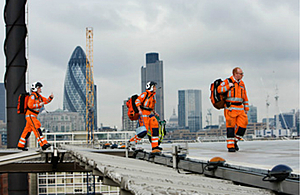£22 million awarded to life-saving health charities during virus outbreak
Mental health, ambulance, social care, learning disabilities, autism and dementia charities are among those set to receive millions of pounds in government funding.

- Health and care charities awarded funding to continue providing life-changing support services
- £22 million in cash grants awarded to mental health, ambulance and other public health charities
- Package part of £750 million unveiled by Chancellor in response to COVID-19
Mental health, ambulance, social care, learning disabilities, autism and dementia charities are among those set to receive millions of pounds in government funding, Health Minister Nadine Dorries has announced today.
Over £22 million in cash grants will be awarded to charities providing vital services to ensure they can meet increased demand as a result of COVID-19, while continuing their day-to-day activities to help those in need.
Coming as the nation marks Mental Health Awareness Week, a total of £4.2 million will be awarded to mental health charities, such as Samaritans, Young Minds and Bipolar UK, to continue to support people experiencing mental health challenges throughout the outbreak. This builds on the £5 million already made available to Mind and the Mental Health Consortia.
Nadine Dorries, Minister of State for Patient Safety, Suicide Prevention and Mental Health, said:
Mental health, learning disabilities and autism charities are providing vital support and advice during this public health crisis, working tirelessly alongside NHS and social care services to help people affected in many different ways.
This epidemic has had huge consequences for us all, but for some it has been especially difficult, leading to loneliness, anxiety and other mental health challenges.
The funding we are providing today – alongside £5 million already awarded to mental health charities – will help to give these organisations a much-needed boost during this outbreak so that they can keep doing what they do best.
St John Ambulance and Air Ambulances UK will each receive over £6 million to continue to provide life-saving services throughout the outbreak.
The funding will also provide cash grants to charities supporting people with cancer and dementia, carers and to support the adult social care and community healthcare systems.
Ed Argar, Minister of State for Health, said:
Every day, charities perform amazing work for our communities – whether that’s providing air ambulances during accidents and emergencies, or much-needed support and advice to people suffering from illness or just needing help and a friendly ear. During this COVID-19 pandemic, these services are more important than ever to many people.
Therefore, I am pleased that today’s funding awards to health and social care charities will help these fantastic organisations to continue with their vital work.
Other recipients of the funding include charities supporting unpaid carers, people with learning disability and autism, pregnant women, those affected by stillbirth or neonatal death and older people.
The money is part of a UK-wide £750 million package of support for the voluntary sector announced by the Chancellor of the Exchequer in April. £360 million of this will be directly allocated by government departments to charities providing key services and supporting vulnerable people during the crisis.
The Department of Health and Social Care has worked to ensure that funding reaches where it is needed most as soon as possible, with the aim for charities to receive money later this month.
The funding will include:
- £4.2m to support mental health charities including Samaritans, Young Minds, Place2Be, Beat, Mental Health UK, Bipolar UK, CALM and charities within the National Bereavement Alliance
- Up to £6.8 million to support St John Ambulance
- £6 million to support Air Ambulances
- £6 million to support various charities, including those working with people with learning disabilities, autism and complex needs (National Autistic Society, British Institute for Learning Disabilities, MENCAP, Learning Disability England, Contact, Respond, The Challenging Behaviour Foundation), those working to support people with cancer (Anthony Nolan Trust, Jo’s Cervical Cancer Trust, Blood Cancer UK) and stroke and dementia charities, and those that support the adult social care system (Carers UK, Alzheimer’s Society, Race Equality Foundation, Royal Osteoporosis Society, Stroke Association)
This funding will also go to charities supporting pregnant women, babies in neonatal intensive care and those affected by stillbirth and neonatal deaths (Tommy’s, Bliss and Sands) and support for specialist addiction and recovery charities.
Background information
Air ambulance critical emergency services are not funded by the NHS. Although they receive some support from NHS ambulance services which provide them with clinical staff and equipment, vital charitable donations from the public cover the costs of keeping services running.
Examples of the type of projects this money will fund include:
Blood Cancer UK
- Targeted symptom campaign encouraging people with undiagnosed blood cancer to seek diagnosis and treatment in line with the latest NHS messaging on the most appropriate pathways for accessing non-COVID services – directly addressing ‘fear factor’ amongst prospective patients.
- Boosting the resilience of the growing NHS workforce: a telephone Listening and Welfare Service to support UK haematology healthcare professionals delivered by counsellors and psychologists.
Anthony Nolan
- Setting up a 24-hour emergency hub at Heathrow Airport to ensure continued delivery of stem cells to hospitals and patients.
Jo’s Cervical Cancer Trust
-
Jo’s Cervical Cancer Trust is responding to the COVID-19 pandemic through supporting women directly with several open support systems, and providing insight and expertise to organisations such as NHS England and Public Health England.
-
Jo’s Cervical Cancer Trust has is running outreach teams across the country, and a front-line service in hospitals. Carers UK
-
This funding will enable Carers UK to extend their helpline, information and advice services so unpaid carers are able to access trusted information and advice.